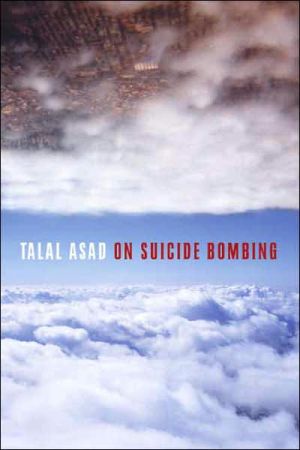On Suicide Bombing
Like many people in America and around the world, Talal Asad experienced the events of September 11, 2001, largely through the media and the emotional response of others. For many non-Muslims, "the suicide bomber" quickly became the icon of "an Islamic culture of death"—a conceptual leap that struck Asad as problematic. Is there a "religiously-motivated terrorism?" If so, how does it differ from other cruelties? What makes its motivation "religious"? Where does it stand in relation to other...
Search in google:
Like many people in America and around the world, Talal Asad experienced the events of September 11, 2001, largely through the media and the emotional response of others. For many non-Muslims, "the suicide bomber" quickly became the icon of "an Islamic culture of death"& mdash;a conceptual leap that struck Asad as problematic. Is there a "religiously-motivated terrorism?" If so, how does it differ from other cruelties? What makes its motivation "religious"? Where does it stand in relation to other forms of collective violence?Drawing on his extensive scholarship in the study of secular and religious traditions as well as his understanding of social, political, and anthropological theory and research, Asad questions Western assumptions regarding death and killing. He scrutinizes the idea of a "clash of civilizations," the claim that "Islamic jihadism" is the essence of modern terror, and the arguments put forward by liberals to justify war in our time. He critically engages with a range of explanations of suicide terrorism, exploring many writers' preoccupation with the motives of perpetrators. In conclusion, Asad examines our emotional response to suicide (including suicide terrorism) and the horror it invokes. On Suicide Bombing is an original and provocative analysis critiquing the work of intellectuals from both the left and the right. Though fighting evil is an old concept, it has found new and disturbing expressions in our contemporary "war on terror." For Asad, it is critical that we remain aware of the forces shaping the discourse surrounding this mode of violence, and by questioning our assumptions about morally good and morally evil ways of killing, heilluminates the fragile contradictions that are a part of our modern subjectivity. The New York Times - Samantha Power How real is the difference between our foes and us? One of the most incisive challenges to current debates comes from Talal Asad, whose On Suicide Bombing…takes aim less at the Bush administration than at the rest of us, and at what he sees as our unspoken complicity in "some kinds of cruelty as opposed to others." He hopes, he writes, to "disturb the reader sufficiently" by showing the hypocrisy of rules that permit murderous conduct by states but deny it to nonstate actors…Asad's book is valuable because the legal distinctions he is challenging are especially vulnerable now. They are vulnerable sociologically, in that millions—if not billions—of people around the world do not see the difference between a suicide bomber's attack on a pizzeria and an American attack on what turns out to be a wedding party. Asad's challenge is one politicians must answer if they stand any chance of recapturing hearts and minds.
The creation of terror and the perpetration of atrocities are aspects of militant action in the unequal world we inhabit, of our notions of what is cruel and what is necessary, and of the emotions with which we justify or condemn particular acts of death-dealing. I do not plead that terrorist atrocities may sometimes be morally justified. I am simply impressed by the fact that modern states are able to destroy and disrupt life more easily and on a much grander scale than ever before, and that terrorists cannot reach this capability. I am also struck by the ingenuity with which so many politicians, public intellectuals, and journalists provide moral justifications for killing and demeaning other human beings. This book does not pretend to offer solutions to moral dilemmas about institutionalized violence. It makes no case for accepting some kinds of cruelty as opposed to others. Its hope, rather, is to disturb the reader sufficiently so that he or she can take a distance from the complacent public discourse that pre-packages moral responses to "terrorism," "war," and "suicide bombing."-from the introduction
\ BookforumProvocative.\ — Jonathan Shainin\ \ \ \ \ \ The New York Times Book ReviewAsad's book is valuable because the legal distinctions he is challenging are especially vulnerable now.\ — Samantha Power\ \ \ \ BookforumProvocative.\ \ \ \ \ \ The New York Times Book ReviewAsad's book is valuable because the legal distinctions he is challenging are especially vulnerable now.\ \ \ \ \ \ Samantha PowerHow real is the difference between our foes and us? One of the most incisive challenges to current debates comes from Talal Asad, whose On Suicide Bombing…takes aim less at the Bush administration than at the rest of us, and at what he sees as our unspoken complicity in "some kinds of cruelty as opposed to others." He hopes, he writes, to "disturb the reader sufficiently" by showing the hypocrisy of rules that permit murderous conduct by states but deny it to nonstate actors…Asad's book is valuable because the legal distinctions he is challenging are especially vulnerable now. They are vulnerable sociologically, in that millions—if not billions—of people around the world do not see the difference between a suicide bomber's attack on a pizzeria and an American attack on what turns out to be a wedding party. Asad's challenge is one politicians must answer if they stand any chance of recapturing hearts and minds.\ —The New York Times\ \








